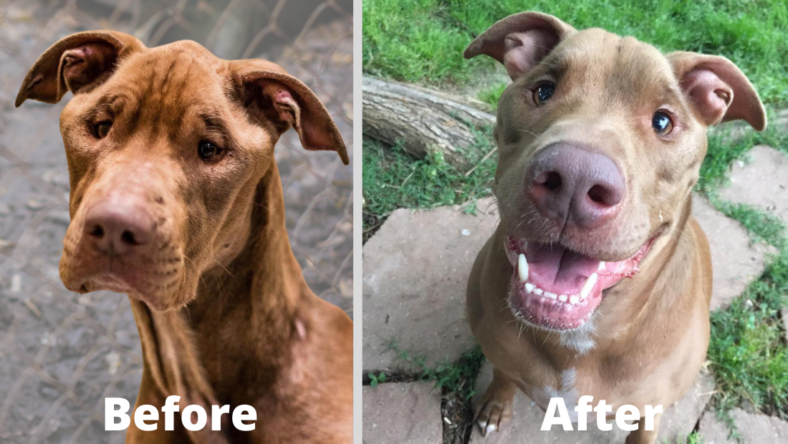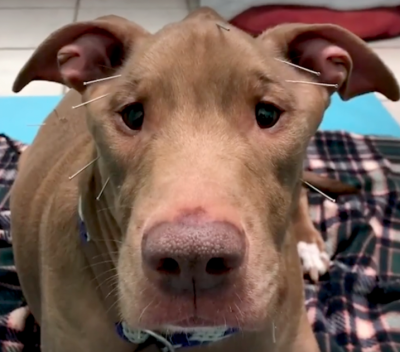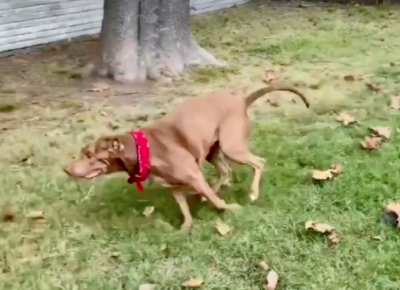Skinny Dog with Masticatory Muscle Myositis Lives Her Best Life

Everyone loves a good underdog story, and there’s no better example than that of Destiny, a skinny little pit bull shelter dog with masticatory Muscle Myositis. Destiny has found herself a loving forever home, but as you will soon see, it was by no means an easy journey for her to get there.
Destiny’s Story

When Destiny’s mom, Sherry, found her, this pup was a nameless face in a shelter. Destiny was emaciated, sick, and, being a pit bull mix (considering all of the stigmas that go along with being a pitbull), had a lot of factors stacked against her chances of adoption. Fortunately, Sherry knew this. After laying eyes on this sad pup, Sherry sprung to action.
Armed with treats, nutritious food, and plenty of love, Sherry adopted Destiny the next day. Sherry first step was to get Destiny to a healthy weight, which she accomplished by feeding her small amounts of food regularly under a strict regiment. She has also worked alongside her vet, Doctor Freezy, to ensure that Destiny continues to thrive. In addition to western medicine, Destiny also enjoys occasional acupuncture treatments to keep her masticatory muscle myositis under control.

What is Masticatory Muscle Myositis?
While Destiny now enjoys an amazing home life with her mom, Sherry, there are still plenty of things to learn from this amazing pup! One of the biggest things we can gain from Destiny is a deeper knowledge of masticatory muscle myositis.
In clinical terms, MMM is a fairly uncommon myopathy of the muscles involved in chewing and eating. When the disease is active, it slowly decreases the efficacy and ability of the afflicted dog’s chewing muscles. This leads to jaw pain, choking, and emaciation. While scientists are still trying to work out the specifics, it is believed to be a genetic problem. It is more common in large breeds, such as retrievers and pit bulls.
What are the Symptoms of Masticatory Muscle Myositis?

Masticatory muscle myositis is a progressive disease with periods of remission. When the disease is in remission, there are no symptoms. In the early stages, it may not even be obvious that a dog has the disease.
When the disease is active, however, the afflicted pup’s inflammatory immune response targets their chewing muscles. This results in swollen, painful jaws, which make it hard for the dog to chew or open their mouth. Dogs may reflect this discomfort by being less vocal, eating less, and being prone to choking. In some cases, dogs may have slightly sunken or protruding eyes.
Beyond their jaw issues, however, dogs with MMM are otherwise healthy. They present with no other neurological or physical challenges.
How Fast Does MMM?
The inflammation of acute and chronic stage masticatory muscle myositis eventually breaks down the diseased tissue, causing problems with opening the mouth and eating.
There is no real way to know how quickly the disease will progress without treatment. Many dogs may live a happy, filled life with the disease, while others will need rapid treatment. Many factors determine how likely a pup is to experience flare-ups and, subsequently, complications.
Is Masticatory Muscle Myositis Curable?
Fortunately, there are treatments available for MMM. While there is no cure for masticatory muscle myositis, rapid and aggressive immunotherapy can prevent future flare-ups and complications.
How Much Does Masticatory Muscle Myositis Treatment Cost?
To determine whether or not your pup has MMM, you’ll need to start with a 2M antibody test, which will be anywhere from $100–$150. If this test confirms that your pup has MMM, then it’s time to start considering further investments.
Overall, the treatment for masticatory muscle myositis isn’t very expensive. It is ongoing, and the main cost you’ll probably see is the initial test. On average, you can expect to pay $50–$100 per month to treat your pup.
What Are Natural Masticatory Muscle Myositis Treatment Options?
In addition to traditional medicines, such as Prednisone, there are also traditional alternatives. Destiny, for example, enjoys regular acupuncture treatments. Herbs, vitamin doses, and massages are other possible routes for treating MMM. Many of these do not necessarily treat the problem, however, and their primary goal is to help mask and ease symptoms.
Regardless of what you opt to use to treat your pet, you should always consult your veterinarian first. Your vet is your dog’s expert caretaker, and they will be able to find the perfect options for your pet. Remember: all dogs are different. While one pooch may love the relief offered by acupuncture, another may hate it! You want to make sure your dog is as comfortable as possible, so be smart with your treatments.
Here are pictures of dogs with masticatory muscle myositis




